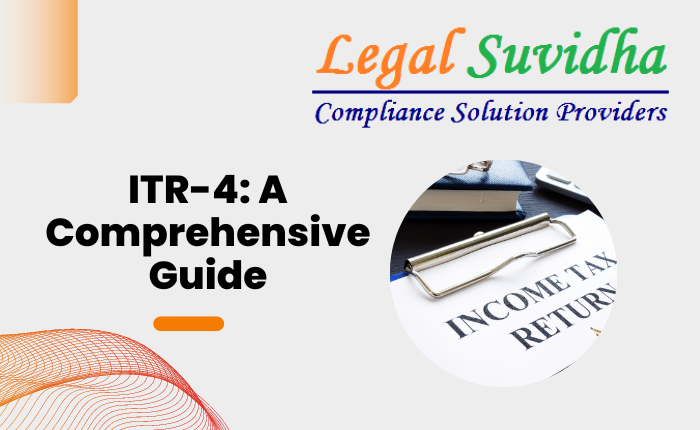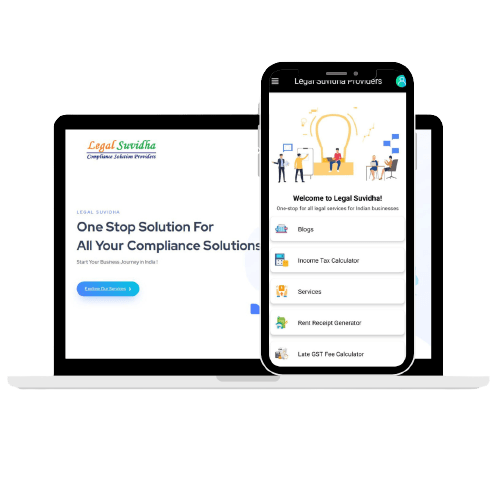Filing income tax returns is an essential obligation for individuals and businesses in India. The Income Tax Department of India has introduced various forms to cater to different types of taxpayers and income sources. Among these forms, ITR-4 holds significance for individuals and Hindu Undivided Families (HUFs) with income from a presumptive business or profession. In this blog post, we will delve into the details of ITR-4, its applicability, and the information required for filing.
What is ITR-4?
ITR-4, also known as the Sugam form, is an income tax return form specifically designed for small businesses, professionals, and individuals with income from a presumptive business or profession. It enables taxpayers to report their income and claim deductions for a simplified calculation of taxable income.
Applicability of ITR-4:
ITR-4 is applicable for individuals and HUFs who fulfill the following criteria:
a) They have income from a business or profession under the presumptive taxation scheme as per Section 44AD, Section 44ADA, or Section 44AE of the Income Tax Act.
b) Their total income does not exceed Rs. 50 lakhs in the financial year.
c) They have not opted for the taxation regime under Section 115BAC (New Tax Regime) and have chosen to pay taxes under the existing tax slabs.
Who is exempted from filing ITR-4 for the assessment year 2023-24?
1. Individuals with income exceeding Rs 50 lakh from salary, house property, or other sources cannot utilize this form.
2. Individuals who serve as directors in a company and have invested in unlisted equity shares are ineligible to use this form.
3. Individuals, Hindu Undivided Families (HUFs), or partnership firms whose books of accounts are required to be audited under the Income Tax Act, 1961.
4. Residents who are not ordinarily residents (RNOR).
5. Non-residents.
6. Individuals who are either directors in a company or have invested in unlisted equity shares.
7. Individuals who have received an eligible start-up Employee Stock Ownership Plan (ESOP) and have deferred tax obligations.
8. Individuals with agricultural income exceeding Rs 5,000.
Key Components of ITR-4:
When filing ITR-4, taxpayers need to provide the following information in detail:
a) Personal Details: The form requires taxpayers to fill in their name, address, PAN, Aadhaar number, contact details, and bank account information accurately. It is essential to ensure the correctness of these details as any errors can lead to complications in the filing process.
b) Business/Profession Details: Taxpayers need to mention the nature of their business or profession, the financial year for which they are filing the return, and provide any registration details if applicable.
c) Income Details: Individuals and HUFs filing ITR-4 must report their income from the presumptive business or profession. This includes providing information such as gross receipts and eligible deductions under the respective sections of the Income Tax Act. It is crucial to accurately calculate and report the income to avoid any discrepancies or potential penalties.
d) Other Sources of Income: If the taxpayer has income from other sources apart from the presumptive business, it needs to be reported separately. This includes income from sources such as salary, house property, capital gains, and interest income. It is important to disclose all income sources to ensure compliance with tax regulations.
e) Deductions: Taxpayers can claim deductions under relevant sections such as Section 80C (for investments in specified instruments), Section 80D (for medical insurance premiums), Section 80G (for donations to eligible charitable institutions), and others. Careful attention should be given to claiming legitimate deductions, as they can significantly reduce the taxable income and consequently the tax liability.
f) Tax Calculation: After providing all the necessary income details and deductions, taxpayers need to calculate their tax liability based on the applicable tax slab rates. It is essential to ensure accurate calculations to avoid any underpayment or overpayment of taxes.
g) Tax Payments and TDS: Taxpayers must report any tax payments made during the financial year, such as advance tax or self-assessment tax. Additionally, if there were any tax deductions made at source (TDS) on income received, it should be reported in the ITR-4 form. These details help reconcile the tax liability and ensure accurate reporting of taxes paid.
h) Verification: Finally, taxpayers need to sign and verify the ITR-4 form before submitting it to the Income Tax Department. This can be done either through a digital signature or by generating and sending a physical copy of the ITR-V (Acknowledgment) to the Centralized Processing Center (CPC) within the specified time.
The ITR-4 form comprises several parts and schedules, each serving a specific purpose in reporting income, deductions, tax computation, and other relevant information. Let’s take a detailed look at each section:
1. Part A: General Information: This section requires the taxpayer to provide general details such as their name, address, PAN (Permanent Account Number), and contact information. It serves as a basic identification and contact information section.
2. Part B: Gross Total Income: In this part, the taxpayer needs to provide information about their income from various sources. This includes income from business or profession, salary, house property, capital gains, and any other income sources. It helps in determining the total gross income earned during the financial year.
3. Part C: Deductions and Total Taxable Income: This section allows the taxpayer to claim deductions under various sections of the Income Tax Act. Deductions can be claimed for investments made in specified schemes such as Section 80C, which covers investments in life insurance premiums, provident fund contributions, and more. Other sections, such as 80D for medical insurance premiums, also offer deductions. After accounting for the eligible deductions, the taxpayer calculates their total taxable income.
4. Part D: Computation of Tax Payable: In this part, the taxpayer computes the income tax payable based on the taxable income determined in Part C. It involves the calculation of tax liability, considering the applicable tax slabs and rates. Additionally, if the taxpayer is subject to any surcharge or education cess, those amounts are included in the tax computation.
5. Part E: Other Information: This section collects additional details from the taxpayer. It includes information such as bank account details for receiving tax refunds, details of advance tax and self-assessment tax payments made during the financial year, and details of any tax deducted at source (TDS) by employers or other deductors.
6. Schedule BP: Business or Profession: If the taxpayer has income from a business or profession, they need to provide the relevant details in this schedule. It includes information about the turnover, expenses incurred, depreciation claimed, and other related information. This schedule helps in reporting the income and expenses related to the business or profession opted for under the presumptive taxation scheme.
7. Schedule AL: Assets and Liabilities: This schedule requires the taxpayer to disclose information about their assets and liabilities. It includes details of immovable properties, such as land, houses, and commercial buildings, as well as movable properties like vehicles, jewelry, and other valuables. Additionally, loans and advances taken by the taxpayer are also reported in this schedule.
8. Schedule IT: Statement of Payment of Advance Tax and Tax on Self-Assessment: This schedule is used to provide details of any advance tax or self-assessment tax payments made by the taxpayer during the financial year. It includes information about the dates and amounts of the tax payments, ensuring that the taxpayer’s tax liability is correctly accounted for.
Conclusion:
Filing income tax returns accurately and on time is crucial for every taxpayer in India. ITR-4 simplifies the process for individuals and HUFs with income from a presumptive business or profession. By understanding the applicability of ITR-4, gathering the necessary information, and adhering to the deadlines, taxpayers can fulfill their obligations while ensuring compliance with tax laws. Always consult a tax professional or refer to the Income Tax Department’s guidelines for any specific queries or doubts regarding ITR-4 or income tax filing in India. It is essential to stay updated with any changes in tax laws and regulations to ensure a smooth and hassle-free tax filing experience.
If You have any queries then connect with us at [email protected] or [email protected] & contact us & stay updated with our latest blogs & articles





















